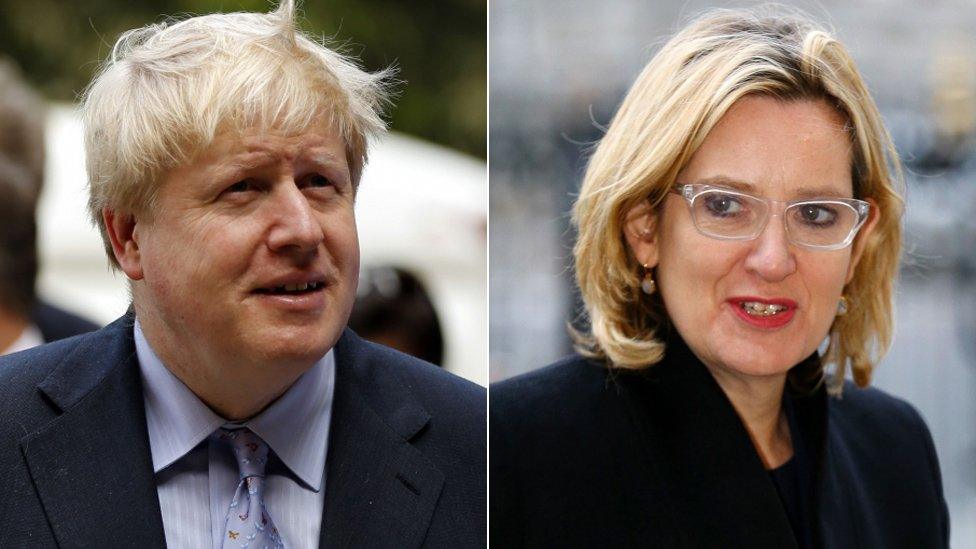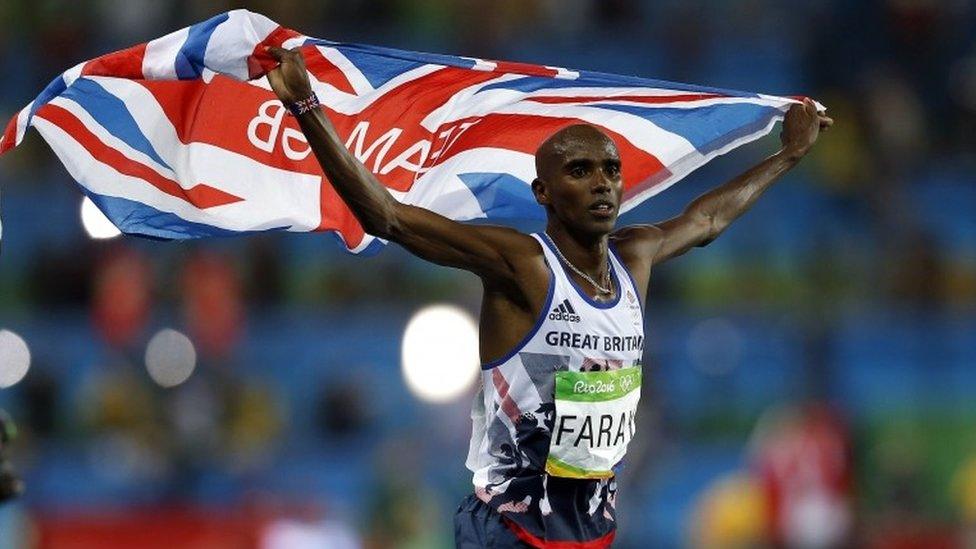US travel ban: UK dual nationals not affected says Foreign Office
- Published

Boris Johnson and Amber Rudd are to speak to their opposite numbers in the US
The US border clampdown should not affect UK nationals travelling to the US, even if they were born in one of the countries on which restrictions have been placed, officials say.
But new guidance says those with dual nationality travelling from Iraq, Iran, Libya, Somalia, Sudan, Syria or Yemen could face extra border checks.
Foreign Secretary Boris Johnson earlier contacted US officials for clarification over the 90-day ban on visa holders from the seven countries ordered by President Trump.
Earlier Mr Johnson tweeted it was "divisive and wrong" to stigmatise people on the basis of nationality.
It came after Prime Minister Theresa May came under fire for not condemning the order earlier.
A spokesman for British Olympic champion Sir Mo Farah, who was born in Somalia and lives in the US, said he was "relieved" to learn that the order would not apply to him, but said he "fundamentally disagrees with this incredibly divisive and discriminatory policy".
He earlier said it was "deeply troubling" that he may have had to tell his children he could not go home.
Meanwhile, a petition to stop a state visit to the UK by President Trump later this year may be debated in Parliament, after amassing more than 500,000 signatures.

Who is affected by the ban?
Advice issued by the Foreign Office said:
The presidential executive order only applies to individuals travelling from one of the seven named countries
If you are travelling to the US from anywhere other than one of those countries, including the UK, the executive order does not apply to you and you will experience no extra checks regardless of your nationality or your place of birth
If you are a UK national who happens to be travelling from one of those countries to the US then the order does not apply to you even if you were born in one of those countries
If you are a dual citizen of one of those countries travelling to the US from outside those countries then the order does not apply to you
The only dual nationals who might have extra checks are those coming from one of the seven countries themselves - for example a UK-Libya dual national coming from Libya to the US
The Foreign Office said the US has reaffirmed its strong commitment to the "expeditious processing" of all travellers from the UK.
However, there have been cases of people who have been caught up in the ban, including a Glasgow vet who was told she could not fly from Costa Rica via New York as she travels on an Iranian passport.

The prime minister had been criticised for not condemning the US order when she was first asked about it, at a press conference in Turkey on Saturday.
She initially said it was up to the US to decide its policy on refugees but No 10 later issued a statement saying she did "not agree with this kind of approach and it is not one we will be taking".
Mrs May asked Mr Johnson and Home Secretary Amber Rudd to speak to the State Department and the Department of Homeland Security.
Downing St said it showed she was "absolutely determined" to respond to fears about the ban.

Analysis
By Susana Mendonca, BBC political correspondent
There is a much tougher message coming from Downing Street today. Theresa May has ordered the foreign secretary and home secretary to make representations to their opposite numbers in the US government about the travel ban, and both Boris Johnson and the Chief Secretary to the Treasury David Gauke have called Mr Trump's policy "divisive" and "wrong".
The British government is at pains to make it clear just how much it disagrees with this US travel ban. Theresa May's failure to do that at a press conference in Turkey yesterday led to a backlash from MPs on all sides who had wanted to see a tougher stance - given she had promised not to be afraid to tell Donald Trump when she didn't agree with him. That's hard do, though, when Mrs May also needs to forge a good working relationship with the controversial new president.
Mr Gauke, defending the PM this morning, said she wasn't the kind of politician who "shoots from the hip"; that she had to see the evidence first; and that was why she wasn't quick to judge. Even Nadhim Zahawi MP - himself a victim of Mr Trump's travel ban - was at pains not to criticise the PM personally.
But now the PM faces another potential problem, as a petition calling for Donald Trump not be invited for a State visit to the UK has already gained enough signatures to be considered for a debate in parliament.

It is understood Mr Johnson has been speaking to Mr Trump's chief strategist Steve Bannon and senior adviser Jared Kushner about how to stop travelling Britons being affected by the 90-day travel ban for nationals from Iran, Iraq, Libya, Somalia, Sudan, Syria and Yemen.
Earlier Mr Johnson joined those speaking out against Mr Trump's executive order, writing on Twitter: "We will protect the rights and freedoms of UK nationals home and abroad."
MP Zahawi says Trump order banning him from US is "demeaning and sad"
Conservative MP Nadhim Zahawi, who was born in Iraq, is among those who have said they would not be able to travel to the US while the temporary ban is in place.

Labour leader Jeremy Corbyn said it would be "totally wrong" for a proposed state visit to the UK by Mr Trump to go ahead while the row continued.
Labour's former leader Ed Miliband said Mrs May must "get on the phone" to the president.
"You're the prime minister," he said. "Get on the phone to the president and tell him the ban cannot stand. And do it today."
London Mayor Sadiq Khan told Sky News the UK "should not be rolling out the red carpet for President Trump" while the travel ban was in place.
Scotland's First Minister Nicola Sturgeon also said it should not go ahead while the order was in place.